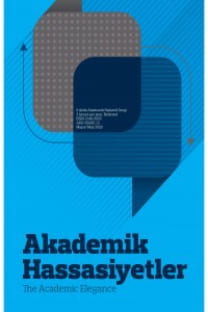HALKLA İLİŞKİLER İÇİN BİR PARADİGMA ÖNERİSİ
Halkla ilişkiler, Yönetim bilimi, Organizasyon teorisi, Paradigma
A PARADIGM PROPOSAL FOR PUBLIC RELATIONS
___
- Akat, İ., Budak G., Budak G. (1997). İşletme Yönetimi, İzmir: Barış Yayıncılık.
- Anık, C. (2002). “Sistem Kuramları Açısından Baskı Grupları”. İletişim. 14.
- ss.61-92.
- Anık, C. (1997). Çoğulcu Sistemde İş Sendikası, Ankara: Hizmet-İş Sendikası Eğitim Yayınları.
- Anık, C., Soncu, A. G. (2017). “Management Relations in the Context of Proverbs: The Case of Turkey”, Practise Fields in Public Relations: The Panaroma of Turkey..( Ed. Ü. Arklan). Frankfurt: Peter Lang, ss.11-36
- Bertalanffy, L. V. (1969). General System Theory, New York: George Braziller.
- Buchanan, D. A., Huczynski, A. A. (2019). Organizational Behaviour, Harlow: Pearson.
- Certo, S. C., Certo, S. T. (2016). Modern Management: Concepts & Skills, Boston: Pearson.
- Daft, R. L. (2008). Management, USA: Thomson South-Western.
- Efil, İ. (2015). İşletmelerde Yönetim ve Organizasyon, Bursa: Dora.
- Fayol, H. (1954). General and Industrial Management, (Çev. C. Storrs) London: Sir Isaac Pitman and Sons.
- Gitlow, H. S., Gitlow, S. J. (1987). The Deming Guide to Quality and Competitive Position, New Jersey: Prencite-Hall.
- Griffin, R.W. (2013). Management, USA: South-Western Cengage Learning.
- Haimann, T., Scott, W. G., Connor, P. E. (1978). Managing the Modern Organization, Boston: Houghton Mifflin.
- Hanavcı, İ. (2019). “The Use of New Media As A Tool in The Context of Governmental Public Relations: The Sample of Maltepe Municipality”, New Horizons in Communication Age. (Ed. B. Alıcı, Ö Aydınlıoğlu). Ankara: İksad Publishing House, ss.309-355.
- Harlow, R. F. (1976). “Building a Public Relations Definition”. Public Realtion Review. 12. ss.34-42.
- Katz, D., Kahn, R. L. (1978). The Social Psychology of Organizastions, New York: John Wiley & Sons.
- Koçel, T. (1998). İşletme Yöneticiliği, İstanbul: Beta Basım.
- Koontz, H., O’Donnell, C. (1955). Principles of Management: An Analysis of
- Managerial Funcitions, New York: McGraw-Hill Book Company.
- Lunenburg, F. C., Ornstein, A. C. (2012). Educatioanl Administration:
- Concepts and Practices, USA: Wadsworth Cengage Learning.
- Luthans, F., Stewart, T. I. (1977). “A Brief Contingency Theory of Management”. The Academy of Management Review. 2. ss.181-195.
- Mele, C., Pels, J., Polese, F. (2010). “A Brief Review of System Theories and Their Managerial Applications”. Service Science. 2. ss.126-135.
- Morgan, G. (1990). Organization in Society, New York: McMillan Educaiton.
- Mullins, L. J. (2005). Management and Organizational Behaviour, Harlow: Prentice Hall.
- Ng, I., Maull, R., Yip, N. (2009). “Outcome-based Contracts as a Driver for System Thinking and Service-Dominant Logic in Service Science:
- Evidence from the Defence Industry”. European Management Journal. 6. ss.377-387
- Ouchi, W. G. (1981). Theory Z,. USA: Addison-Wesley Publishing.
- Önday, Ö. (2016). “Classical Organization Theory: From Generic Management of Socrates to Bureaucracy of Weber”. International Journal of Business and Management Review. 1. ss.87-105.
- Parker, L. D., Lewis, N. R. (1995). “Classical Management Control in Contemporary Management and Accounting: The Persistence of Taylor and Fayol’s Word”. Accounting Business and Financal History. 5(2). ss.211-236.
- Pentecost, D. (1991). “Qualty Management: The Human Factor”. European Participation Monitor. 6. ss.8-10.
- Pryor, M. G., Taneja, S. (2010). “Henri Fayol, Praticioner and Theoretician – Revered and Reviled”. Journal Management History. 4. ss.489-503.
- Rahim, A. M. (2001). Managing Conflict in Organizations, London: Quorum Books.
- Robins, S. R., Coulter, M. (2012). Management, Boston: Prentice Hall.
- Saxonhouse, G. (1993). “Ecomoic Growth and Trade Relations: Japanese Performace in Long-Term Perspective”. Trade and Protectionism NBER-EASE Vol 2.(Ed. T. Ito,. O. Krueger). USA: University of
- Chicago Press, ss.149-182
- Schacter, H. L. (2010). “The Role Played by Frederick Taylor in the Rise of the Academic Management Fields”. Journal of Management History. 4. ss.437-448.
- Schermerhorn, J. R. (2013). Management, USA: John Wiley and Sons.
- Shaftritz, J. M., Ott, J. S., Jang Y. S. (2016). Classics of Organization Theory, Boston: Cengage Learning.
- Soncu, A. G. (2018). “Halkla İlişkiler Açısından Hermeneutik Yöntem”. İletişim Kuram ve Araştırma Dergisi. 46. ss.186-206.
- Soncu, A. G., Kurt, M. C. (2018). “Halkla İlişkiler Faaliyetlerinde Kullanılan Dil: T.C. Aile ve Sosyal Politikalar Bakanlığı Örneği”. Erciyes İletişim Dergisi: 4. ss.713-732
- Stivers, C. (2003). “Administration Versus Management: A Reading From Beyond the Boundaries”. Administration and Society. 35. ss.210-230.
- Taylor, F. W. (1947). Principles of Scientific Management, Connecticut:
- Greenwood Press.
- Timmermann, D. (2017). “Producitvity, Effectiveness, Efficiency Basic Concepts of the Economics of Educition”, Schools in Transition. (Ed. P. Siljander, K. Kontio, E. Pikkarainen). Roterdam: Sense Publishers.
- Williams, Chuck (2011). Management. USA: Soıuth-Western Cengage Learning.
- Wren, D. A., Bedeian, A. G. (2018). The Evolution of Management Thought. New Jersey: John Wiley and Sons.
- ISSN: 2148-5933
- Yayın Aralığı: 3
- Başlangıç: 2014
- Yayıncı: A Kitap
Yusuf GÜNEYSU, Oğuz Yusuf ATASEL, Yasin ŞEKER
KÜRESEL YOLSUZLUK ENDEKSLERİ: ELEŞTİREL BİR DEĞERLENDİRME
Yusuf PUSTU, Abdul Malik ABDULAİ, Murat İNCE
SİBER UZAMA YÖNELİK POLİTİK SÖYLEMDE İLETİŞİM GÜVENLİK YAKINSAMASI: ABD, AB VE TÜRKİYE ÖRNEĞİ
Eylül KABAKÇI GÜNAY, Ferhat TOPBAŞ
HALKLA İLİŞKİLER İÇİN BİR PARADİGMA ÖNERİSİ
BİRLEŞİK KRALLIK'TAKI TÜRKİYE KÖKENLI İNGİLİZ VATANDAŞLARININ SİYASETE KATILIMINDA KURUMLARIN ROLÜ
Kahraman GÜLER, Ayşe Mine TUNCAY
Mikail PEHLİVAN, Abdurrahman KAYA, Seda Selin KELEŞ
AHMET HAŞİM’İN ŞİİRLERİNE HAFİFLİK VE AĞIRLIK İMGELERİ MERKEZİNDE BİR YAKLAŞIM
